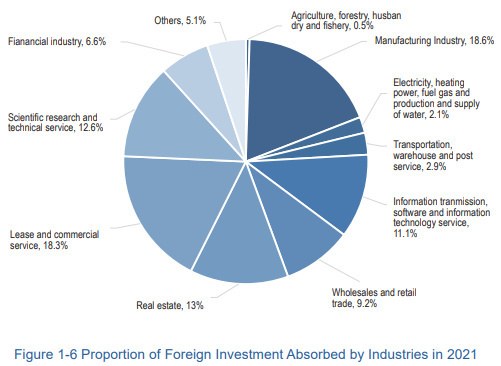Understanding the Power of Xiaohongshu for Your China Marketing Strategy
June 13, 2023

April 28, 2023

Why Should Foreign Companies Enter the China Market?
Entering the Chinese market is a market with both challenges and opportunities for companies. It requires companies to fully understand the various factors of the Chinese market and to conduct reasonable market strategies and risk management in order to be successful in the Chinese market.
Market size:
China is the most populous country in the world and has a huge consumer market. This provides more opportunities and potential profits for companies.
Economic growth:
China's economy has grown rapidly over the past few decades and is one of the world's largest exporters. China's economic development has led to an increase in the income level and purchasing power of its people, stimulating the growth of the consumer market.
Demographics:
As China's economy grows, the country's middle class is expanding. The increasing number of middle class population means higher purchasing power and higher quality of life, which is a huge opportunity for companies.
Consumer behavior:
Chinese consumers are very loyal to brands and demand strict product quality and safety. Understanding Chinese consumers' behavior and preferences is important for companies to enter the Chinese market.
Government Support:
The Chinese government supports foreign companies to enter the Chinese market, including providing preferential policies, tax incentives and support for resources such as land.
Geographical location:
China is located in the heart of Asia and is connected to other Asian countries. Access to the Chinese market can facilitate companies' entry into the Asian market.
Talent and technology:
China has a large talent pool and advanced technology, which provides companies with opportunities to cooperate with local companies and can attract more international companies to enter the Chinese market.
If you also want to enter the Chinese market, dive with us and we will take you through the Chinese market.
Before Enter the Chinese Market, You Need to Know.

Selling your products in China as a foreign seller can be challenging, but by following these steps, you can increase your chances of success in the Chinese market.
Conduct Market Research:
Before selling your product in China, you need to research the market and see if there is a demand for your product. You should also investigate your competitors and pricing strategy.
Register your Company:
To legally sell your products in China, you must register your company in China. This includes obtaining a business license, tax registration, and other necessary permits.
Choose a Sales Channel:
There are different sales channels you can use to sell your products in China, including online marketplaces like Alibaba, JD.com, and Taobao, or through a distributor or agent.
Localize your Products:
Your product packaging, labeling, and instructions must be translated into Chinese. You should also consider adapting your product to the Chinese market, which may require modifications to your product's design or features.
Ensure Compliance with Regulations:
China has strict regulations on imported products, and you must ensure that your product complies with these regulations. This includes obtaining certifications and approvals, such as the China Compulsory Certification (CCC) mark.
Build Trust with Chinese Consumers:
Chinese consumers value trust, and you must establish a strong reputation and brand recognition to be successful in the Chinese market. This can be achieved through marketing campaigns, building relationships with customers, and providing excellent customer service.
How to Enter the China Market?

Maybe you are also curious about this and how you need to enter the Chinese market, please don't worry, please read on.
Establishing a localized brand image:
Establishing a localized brand image in the Chinese market is key to successful local market entry. This includes using local language and symbols, taking into account local culture and values, connecting with local consumers, and offering products and services that meet local consumer tastes and needs. By building a localized brand image, a company can enhance its recognition and credibility in the local market and increase consumer loyalty and willingness to buy.
Understand the target market:
Before entering the Chinese market, companies need to gain an in-depth understanding of the local culture, consumer needs and industry trends in order to develop more effective marketing strategies. This includes understanding the local history and culture, understanding local consumers and their buying habits, understanding local laws and regulations, and understanding competitors and market trends. By understanding the target market, the company can develop a more targeted marketing strategy to better meet the needs of local consumers.
Collaborate with local partners:
Working with local partners can help companies better understand the local market and provide insights about the local culture and consumers. In addition, working with local partners can help a company better integrate into the local market and strengthen its credibility and visibility in the local market.
Build brand presence on social media:
Social media is very popular in the Chinese market, so building a brand presence on social media is an effective way to expand a company's reach. By posting interesting and valuable content on social media, interacting with consumers and responding to user comments and feedback, you can build a good brand image and increase your company's visibility and influence.
Offer localized products and services:
Launching localized products and services in the Chinese market can help companies better meet the needs of local consumers and increase brand recognition and loyalty. This includes taking into account local tastes and preferences, providing products and services that fit the local culture, and understanding local consumer buying habits. By providing localized products and services, companies can increase local consumers' willingness to buy and their loyalty.
Expanding reach through word-of-mouth marketing:
In the Chinese market, consumers are very concerned about word-of-mouth and social circles, so it is very effective to expand a company's reach through word-of-mouth marketing. This can be achieved by building good word-of-mouth and word-of-mouth marketing strategies, such as offering quality products and services, motivating users to share and recommend, and using channels such as social media and forums to expand reach.
Leverage China's mobile Internet:
With over 700 million mobile Internet users in China, it is very important to leverage the mobile Internet. This can be achieved by developing applications for mobile devices, using mobile payments and social media, and leveraging channels such as SMS and mobile advertising. By leveraging the mobile Internet, companies can better engage with local consumers and increase brand awareness and reach.
Understand the local digital marketing environment:
Digital marketing is very popular in the Chinese market, so it is important to understand the local digital marketing environment. This includes understanding local channels such as search engines, social media platforms and e-commerce sites, as well as understanding local digital marketing strategies and trends. By understanding the local digital marketing environment, companies can better develop digital marketing strategies to capture the attention of local consumers.
Connect with local consumers:
Connecting with local consumers can help companies better understand the needs and buying habits of local consumers as well as better target their marketing campaigns to the local market. This can be achieved by using social media, hosting events and offering personalized services. By connecting with local consumers, companies can better understand the local market and consumer needs, increasing brand awareness and loyalty.
Understand local laws and regulations:
Before entering the Chinese market, companies need to understand local laws and regulations in order to avoid violating local laws and regulations. This includes understanding local intellectual property laws, consumer protection laws, and advertising laws. By understanding local laws and regulations, companies can develop a more compliant marketing strategy and improve their brand credibility and reputation.
What Distribution Models Can Foreign Companies Use in China?

Each distribution model has its advantages and disadvantages, and the choice of the model depends on factors such as the nature of the products, the size of the market, the regulatory environment, and the level of control desired by the foreign company. It is advisable to consult with legal and financial experts before deciding on a distribution model in China.
Wholly foreign-owned enterprise (WFOE): This is a wholly-owned subsidiary of a foreign company that can operate as a distributor in China. The WFOE model provides complete control to the foreign company over its operations, but it requires a significant investment and compliance with Chinese regulations.
Joint venture (JV): A JV is a partnership between a foreign company and a Chinese partner, where both parties share profits and risks. The Chinese partner can help navigate local regulations and provide access to local networks, while the foreign company can bring in technology, expertise, and funding.
Representative office (RO): An RO is a temporary entity that represents a foreign company in China. It can perform market research, promotional activities, and coordination with local partners, but it cannot engage in direct sales.
Distributorship: A foreign company can also appoint a distributor in China to sell its products. This model allows the foreign company to leverage the local knowledge and networks of the distributor, but it also involves relinquishing control over sales and distribution.
E-commerce: In recent years, e-commerce has emerged as a popular distribution model in China. Foreign companies can set up online stores or partner with established e-commerce platforms to sell their products directly to consumers.
What are the advantages for foreign companies to enter the Chinese market?

Entering the Chinese market can provide foreign companies with access to a large and growing market, cost savings, government support, local resources, and strategic location advantages.
Large market size:
China is the world's most populous country, with over 1.4 billion people, and has a growing middle class with increasing purchasing power. This presents a huge market opportunity for foreign companies looking to expand their customer base.
Cost savings:
China has a relatively low cost of labor and production, making it an attractive location for foreign companies looking to lower their operating costs.
Government support:
The Chinese government is actively working to attract foreign investment and has implemented policies to support foreign companies entering the market. This includes tax incentives, streamlined approval processes, and access to funding.
Strong economic growth:
China has experienced strong economic growth over the past few decades, and the country's economy is expected to continue growing in the coming years. This presents opportunities for foreign companies to tap into this growth and expand their business.
Access to local resources:
Entering the Chinese market can provide foreign companies with access to local resources such as suppliers, distributors, and partnerships. This can help companies better understand the local market and navigate cultural differences.
Strategic location:
China's location in Asia makes it an attractive hub for companies looking to expand their presence in the region. From China, companies can easily reach other Asian markets such as Japan, South Korea, and Southeast Asia.
However, companies should also be aware of the unique challenges and regulatory requirements of doing business in China.
How Foreign Companies Can Effective Brand Marketing In China?

Marketing a foreign brand in China can be a challenging task as the Chinese market has its unique characteristics and cultural nuances. However, there are several effective strategies that foreign companies can use to market their brands in China:
Understand the local culture:
Understanding Chinese culture is critical to any successful marketing campaign in China. Brands need to understand the cultural values, social norms, and behaviors of Chinese consumers to ensure their marketing strategies resonate with the target audience.
Partner with local influencers:
Partnering with local influencers or Key Opinion Leaders (KOLs) can be an effective way to promote a foreign brand in China. KOLs are influential people with a significant following on social media platforms like WeChat, Weibo, and Douyin. They can help brands to reach their target audience and build trust with Chinese consumers.
Leverage Chinese social media platforms:
Chinese social media platforms are essential for any foreign brand looking to market in China. Platforms like WeChat, Weibo, and Douyin have millions of active users and can be used to create brand awareness, generate leads, and engage with customers.
Localize marketing campaigns:
Foreign brands need to localize their marketing campaigns to appeal to Chinese consumers. Localization involves adapting marketing messages, product offerings, and branding to meet local market needs.
Build relationships with local partners:
Building relationships with local partners can help foreign brands navigate the complexities of the Chinese market. Local partners can provide valuable insights into the local market and help brands to establish their presence in China.
Focus on customer experience:
Chinese consumers value a positive customer experience, and brands that prioritize customer service are likely to succeed in the Chinese market. Brands should invest in providing high-quality customer service and building long-term relationships with customers.
Overall, effective marketing in China requires a deep understanding of the local culture, market, and consumer behavior. By leveraging local partnerships, social media platforms, and influencers, and focusing on providing a positive customer experience, foreign brands can successfully market their brands in China.
Do you want to enter the Chinese market?
We are a professional Chinese digital marketing agency located in the economic center Shenzhen, China. As an international team, we believe we will be the right choice for you.